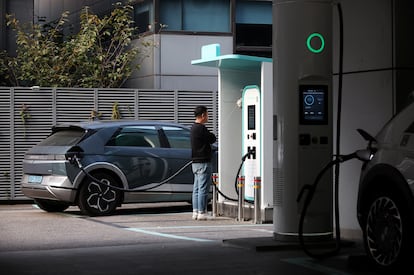Hyundai is rapidly building its first US electric vehicle plant, with production on track for 2025
The company has accelerated construction to take advantage of federal incentives. More than 2,000 people are working each week on the project west of Savannah

The steel skeletons of buildings where Hyundai will stamp, weld, paint and assemble electric vehicles in Georgia span more than a half mile on a sprawling site dotted with so many cranes, bulldozers and construction workers that it almost looks like they’re building a small city.
A year has passed since Hyundai Motor Group broke ground on the $7.6 billion vehicle and battery plant, the South Korean automaker’s first U.S. factory dedicated to producing EVs. Hyundai officials said more than 2,000 people are working each week on the rapidly progressing project west of Savannah, which the company calls its American “metaplant.”
“The site is advancing every day as we work diligently to complete this amazing project,” Hyundai Motor Group Metaplant America CEO Oscar Kwon told reporters visiting the site Wednesday. “We are on track to start production in early 2025 — or, as my boss Jose Munoz likes to say, if not sooner.”
Munoz, Hyundai’s president and global chief operating officer, said last month that the company has accelerated construction to take advantage of federal incentives that reward domestic production of EVs. He said it’s possible the plant could open before the end of next year.
Officials at the construction site Wednesday said the foundation work for the factory’s main production buildings is almost finished and the framework of more than 27,000 tons (24,490 metric tons) of steel is more than 80% complete. Some have roofs and floors, and exterior wall panels have begun to go up.
“It’s hard to believe what has occurred in just one year,” said Trip Tollison, president and CEO of the Savannah Area Economic Development Authority, one of the key local agencies that worked with state officials to lure Hyundai to Georgia.
The plant is being built parallel to Interstate 16 on a site that covers more than 2,900 acres (1,170 hectares). Hyundai says it will build 300,000 EVs each year at the plant. The site will also manufacture batteries to power those vehicles in a partnership between Hyundai and LG Energy Solution.
Hyundai offered a first look Wednesday at some features of the finished plant. Artist renderings showed buildings with plentiful windows and skylights to maximize natural lighting indoors, a large covered parking lot for employees topped with solar panels, and an elevated bridge with glass sides that will let people outside see unfinished cars moving by conveyor from the paint shop to the assembly plant.
The plant will employ 8,500 workers. Tollison said suppliers opening shop in nine Georgia counties near the Hyundai plant will create another 6,000 jobs. It’s the largest economic development project in Georgia’s history. And it came with a whopping incentive package, with state officials and local governments offering $2.1 billion in tax breaks.
Pat Wilson, Georgia’s economic development commissioner, has said Hyundai is projected to have a direct payroll of $4.7 billion over the next 10 years. The company has promised to pay workers a yearly average of $58,105, plus benefits.
Sign up for our weekly newsletter to get more English-language news coverage from EL PAÍS USA Edition
Tu suscripción se está usando en otro dispositivo
¿Quieres añadir otro usuario a tu suscripción?
Si continúas leyendo en este dispositivo, no se podrá leer en el otro.
FlechaTu suscripción se está usando en otro dispositivo y solo puedes acceder a EL PAÍS desde un dispositivo a la vez.
Si quieres compartir tu cuenta, cambia tu suscripción a la modalidad Premium, así podrás añadir otro usuario. Cada uno accederá con su propia cuenta de email, lo que os permitirá personalizar vuestra experiencia en EL PAÍS.
¿Tienes una suscripción de empresa? Accede aquí para contratar más cuentas.
En el caso de no saber quién está usando tu cuenta, te recomendamos cambiar tu contraseña aquí.
Si decides continuar compartiendo tu cuenta, este mensaje se mostrará en tu dispositivo y en el de la otra persona que está usando tu cuenta de forma indefinida, afectando a tu experiencia de lectura. Puedes consultar aquí los términos y condiciones de la suscripción digital.








































